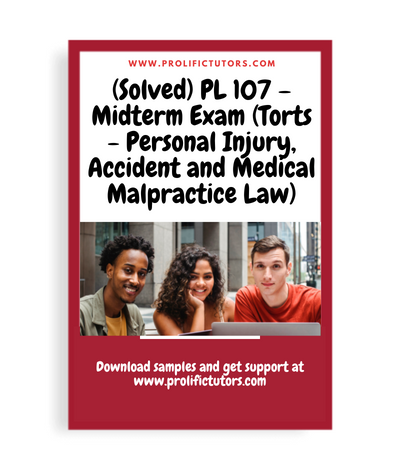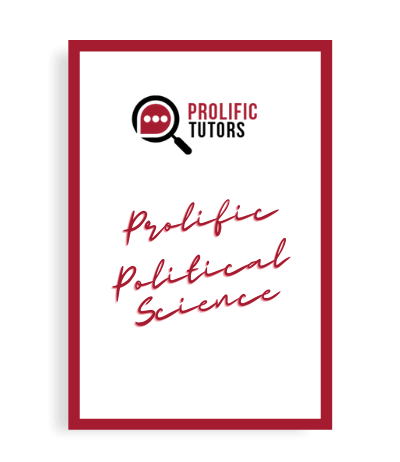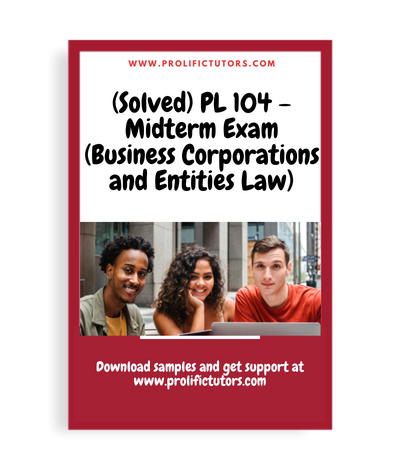Description
(Solved) PL 107 – Midterm Exam (Torts – Personal Injury, Accident and Medical Malpractice Law)
Get the graded answers to the Midterm Exam for the Torts Law Course (PL107) from the New York Paralegal School.
My solutions will guarantee you a score of A+.
These and more questions!
Question
- When considering whether a civil assault has been committed, a person may have various motives, but what is relevant is their intent?
- True
- False
Question
- Judicial proceedings generally are deemed to start when the complaint is filed and, hence, defamations in the complaint or any document filed in conjunction therewith are absolutely privileged?
- True
- False
Question
- Under the common law, the driver of an automobile does not owe his passengers a duty to exercise reasonable care to warn of any known dangers or defective conditions that are not reasonably apparent, and to exercise reasonable care in opening the car?
- True
- False
Question
- The tort of conversion of chattels requires an intentional act by D?
- True
- False
Question
- Under the theory of negligence, the issue is not what D personally believed, but how a “reasonable person of ordinary caution and care” would have acted under the circumstances.
- True
- False
Question
- A person is not privileged to defame another if he reasonably believes his utterances are necessary to protect a legitimate public interest, and that the person to whom the statement is made is empowered to protect that interest.
- False
- True
Question
- Defamations regarding public figures and officials are held to be privileged constitutionally, unless published with knowledge of their falsity or in reckless disregard of the truth (“malice”)?
- True
- False
Question
- Publication is not an essential element of defamation?
- True
- False
Question
- Words alone generally are not enough to constitute an assault?
- True
- False
Question
- A person under a disability is charged with knowledge that he has such disability, and may be found negligent for engaging in any activity that a reasonable person with the same disability would not have attempted?
- True
- False
Question
- The elements of negligence are: an act by the Defendant, a duty owed to P, a breach of that duty, causing damages?
- True
- False
Question
- If P would have sustained the same injury regardless of D’s act, the act is not the cause in fact of the injury, and D will not be liable to P?
- True
- False
Question
- Punitive damages are not recoverable for negligent conduct unless D has engaged inconduct that courts consider “reckless.”
- True
- False
Question
- The Court in Palsgraf v. Long Island Railroad Co held (ruled) that a defendant owes a duty of care only to those who are in the reasonably foreseeable zone of danger?
- True
- False
Question
- Punitive damages are not recoverable for negligent conduct unless D has engaged in conduct that courts considercareless”? X
- True
- False
Question
- The doctrine of “transferred intent” applies where D intends to commit a tort against a person but, instead, commits that tort, or a different tort, upon another person?
- True
- False
Question
- When it comes to assault, D’s acts must have been the proximate cause of P’s apprehension?
- True
- False
Question
- What is reasonable conduct to a reasonable person is decided by the trier of fact, and always depends upon proof of the circumstances that existed at the time of D’s conduct?
- True
- False
Question
- D hired two men to shadow P continually. The shadowing in public was tantamount to a verbal communication and potentially just as harmful (suggesting that P was involved in illegal activities), hence, a defamatory publication?
- True
- False
Question
- Slander usually is an oral defamation, i.e., representatives to the ear. The principal characteristics is that the defamation is in a less permanent and less physical form?
- True
- False
Question
- Where there is a republication of the defamation, the original defamer’s liability is not increased by whatever harm the repetition causes if the republication was either: intended by the original defamer, or reasonably foreseeable?
- True
- False
Question
- In addition to showing that D’s conduct was the cause in fact of P’s injuries, P also must establish that such conduct was the proximate cause of the injuries?
- True
- False
Question
- False imprisonment requires that D must haveacted with the intent to so confine or restrain P or some third person?
- True
- False
Question
- Anyone who has any part in the original publication is treated as an original publisher and, therefore, is liable for the defamation, subject to constitutional limitations. For example, in the case of a defamation appearing in a newspaper, this would include the reporter who writes the defamatory story, the editor, and the owner.
- True
- False
Question
- Under negligence theory, those who are in the class of persons owed the duty of reasonable care is determined by the test of foreseeability?
- True
- False
Question
- The tort of battery does not require a harmful or offensive touching of P by D?
- True
- False
Question
- Truth of the defamatory matter is a complete defense, even if the publication was made out of pure spite and even if D didn’t not believe the statement was true at the time he made it.
- True
- False
Question
- A parent, or anyone else having care or custody of a child, is liable for injuries caused by the child where the parent himself was negligent for failing to control the acts of the child committed in the parent’s presence
- True
- False
Question
- An actor or politician, has no right of privacy concerning reports of his public activities and appearances since these have not been kept private?
- True
- False
Question
- Consent is not a defense to an intentional tort?
- True
- False
Solutions
My Solutions Pack contains 20 more questions in addition to the ones above on the PL107 Midterm Exam.
The Solutions include the question and graded answers from the New York Paralegal School.
You’ll be guaranteed to get each question right!
Click on the ‘Buy’ button above to access the entire document.





![[Top Answer] MATH225N - Week 8 Assignment Correlation and Causation](https://prolifictutors.com/wp-content/uploads/2022/07/Top-Answer-MATH225N-Week-8-Assignment-Correlation-and-Causation.jpg)


Reviews
There are no reviews yet.